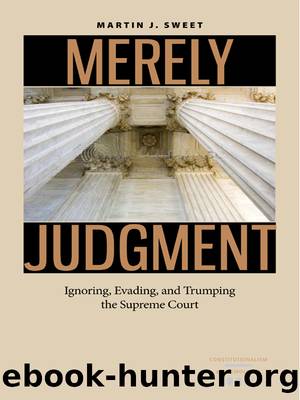Merely Judgment: Ignoring, Evading, and Trumping the Supreme Court by Martin J. Sweet

Author:Martin J. Sweet [Sweet, Martin J.]
Language: eng
Format: epub
Tags: Political Science, History & Theory
ISBN: 9780813930770
Google: mDQXKM144ikC
Goodreads: 20913623
Publisher: University of Virginia Press
Published: 2010-10-15T00:00:00+00:00
5
BEYOND AFFIRMATIVE ACTION
The varied reactions of the elected branches to the Supreme Court's decision in City of Richmond v. J.A. Croson Co. in cities across America demonstrated some different techniques for elected branch monopolization of the constitutional dialogue. Faced with judicial solidarity between the Supreme Court and the lower courts, Philadelphia, Portland, and Miami struggled in different ways to maintain an affirmative action contracting program. Philadelphia and the courts engaged in a long-drawn-out litigationâlegislation modificationâlegislation cycle that wound up with the courts finding Philadelphia's program unconstitutional. Portland engaged an interest group in crafting its new policy and made concessions to that group that lessened the likelihood of litigation; the result is the maintenance of a constitutionally dubious program. And Miami opted to maintain a shell of its program by failing to enforce the program, which substantially reduces the likelihood of litigation against the program. All of these governments engaged in a constitutional dialogue with the courts, with Philadelphia emblematic of the judicial primacy route, Portland representing the elected branch monologue, and Miami presenting the case of mixed resultsâformal noncompliance with informal constitutional consensus. Governments wishing to maintain unconstitutional programs may do so as long as they are able to fashion litigation avoidance techniques.
While the Court's doctrine in Croson is indeed unique, the pat tern established by the case is not. In several other areas of constitutional doctrine, when the Supreme Court strikes down a law, the lower courts express near unanimity, while the elected branches seek out methods of avoiding litigation. This helps explain why fifteen years after the Supreme Court declared legislative vetoes un-constitutional in INS v. Chadha,1 Louis Fisher still identified more than 500 unconstitutional legislative vetoes in federal legislation; less than a decade after the Supreme Court declared flag burning statutes unconstitutional in Texas v. Johnson2 and U.S. v. Eichman,3 Vastine Davis Platte catalogued forty-eight unconstitutional state statutes banning flag desecration or flag misuse; and after fifty-plus years of establishment clause rulings striking down compulsory prayer in schools, including Engel v. Vitale and Abington Township v. Schempp,4 Kevin McGuire catalogued more than 150 schools in a sample of 224 schools that had failed to comply with Supreme Court precedent regarding the establishment of religion. The pattern displayed in Croson resonates across these areas as well. Following Supreme Court adjudication of an issue finding the government practice unconstitutional, the lower courts nearly uniformly implement the Court's policies in a series of derivative lawsuits. Faced with dead-end litigation, the elected branches scramble to ignore, evade, and trump the Supreme Court through creating social, legal, and political barriers to litigation.
About a dozen years after the Supreme Court struck down hate speechârelated statutes as unconstitutional in R.A.V v. City of St. Pau,5 Jon Gould found about 350 colleges and universities still maintaining unconstitutional hate speech regulations. Colleges and universities have largely succeeded in avoiding litigation on the part of students and professors, who one might think would be among the most willing to challenge any perceived slight in a court of law.
Download
This site does not store any files on its server. We only index and link to content provided by other sites. Please contact the content providers to delete copyright contents if any and email us, we'll remove relevant links or contents immediately.
Objection! by Nancy Grace(1775)
Apeirogon by Colum McCann(1688)
Anatomy of Injustice by Raymond Bonner(1650)
That Every Man Be Armed by Stephen P. Halbrook(1569)
Civil Procedure (Aspen Casebooks) by Stephen C. Yeazell(1537)
The Vaccine Court by Rohde Wayne(1491)
Injustices by Ian Millhiser(1486)
Storytelling for Lawyers by Meyer Philip(1451)
A Practical Guide to International Arbitration in London by Hilary Heilbron(1421)
Restitution by Restitution(1418)
Coercing Virtue by Robert H. Bork(1352)
Broken Scales by Joel Cohen(1343)
Tangled Webs: How False Statements Are Undermining America: From Martha Stewart to Bernie Madoff by James B. Stewart(1328)
The Tools of Argument: How the Best Lawyers Think, Argue, and Win by Joel Trachtman(1299)
A Matter of Interpretation by Antonin Scalia(1297)
INDEFENSIBLE: One Lawyer's Journey Into the Inferno of American Justice by Feige David(1278)
American Tragedy by Lawrence Schiller & James Willwerth(1264)
A Religious Orgy in Tennessee by H.L. Mencken(1240)
Tangled Webs by James B. Stewart(1240)
